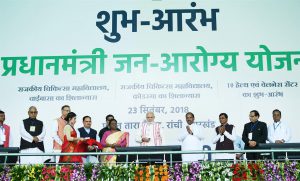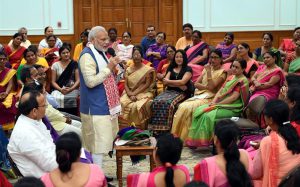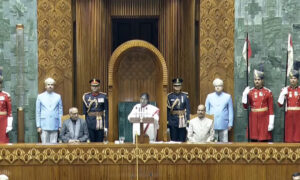
Source: PIB
Recently, Narendra Modi, the Prime Minister of India, launched the health assurance scheme: Ayushman Bharat – Pradhan Mantri Jan ArogyaYojana – at Ranchi, Jharkhand. Speaking on the occasion, the Prime Minister said that this launch has been done with a vision to provide the poorest of the poor, and the underprivileged sections of society, with better healthcare and treatment. He said this scheme, which envisions health assurance of 5 lakh rupees per family per year, will benefit over 50 crore people, and is the world’s biggest health assurance scheme. He added that the number of beneficiaries of this scheme is roughly equal to the population of the European Union, or the population of America, Canada and Mexico, taken together.
He said the first part of Ayushman Bharat – the health and wellness centres, was launched on Babasaheb Ambedkar’s birth anniversary, and the second part – the health assurance scheme, and is being launched two days before Deendayal Upadhyay’s birth anniversary, as the press communique stated.
Explaining how comprehensive the PMJAY is, the Prime Minister said it would cover 1300 illnesses, including serious illnesses such as cancer and heart disease. He said private hospitals too would be part of this scheme.
The Prime Minister said that the amount of 5 lakhs would cover all investigations, medicine, pre-hospitalization expenses etc. He said it would also cover pre-existing illnesses. He said that people can learn more about the scheme by dialling 14555, or through their Common Service Centre
The Prime Minister said that for the States that are a part of PMJAY, people can get the benefit of the scheme in whichever of these States they go to. He said more than 13,000 hospitals across the country have joined the scheme so far.
The Government of India envisioned and launched Ayushman Bharat in 2018 which is aimed at making path-breaking interventions to address healthcare issues holistically ranging from primary to secondary and tertiary care systems. Ayushman Bharat intends to ensure rapid advancement towards attaining the universal healthcare which is designed to reduce the out-of-pocket expenditure.
As the Union Budget 2018-19 laid the foundation for the Mission which is dubbed as the Modicare, the Mission has a defined benefit to cover the intended beneficiaries per year. It is envisioned that the beneficiaries can avail benefits in both public and empanelled private facilities.
Modi inaugurated Health and Wellness Centre to mark the launch of Ayushman Bharat in Bijapur, Chhattisgarh on the Ambedkar Jayanti. The Ministry of Health and Family Welfare is trying to formulate and implement inclusive interventions and initiatives to address healthcare challenges in India. Underlining the importance of the Sustainable Development Goals (SDGs), the Ministry announced the National Health Policy in 2017. As the National Health Policy in 2017 states, the primary aim of the National Health Policy, 2017, is to inform, clarify, strengthen and prioritize the role of the Government in shaping health systems in all its dimensions- investments in health, organization of healthcare services, prevention of diseases and promotion of good health through cross-sectoral actions, access to technologies, developing human resources, encouraging medical pluralism, building knowledge base, developing better financial protection strategies, strengthening regulation and health assurance. It intends to achieve universal health coverage and delivering quality health care services to all at an affordable cost.
The National Health Policy, 2017 has envisioned Health and Wellness Centres as the foundation of India’s health system. Under the Policy, 1.5 lakh centres will bring health care system closer to the homes of people. These centres will provide comprehensive health care, including for non-communicable diseases and maternal and child health services. As the Policy envisaged, these centres will also provide free essential drugs and diagnostic services. Contribution of private sector through CSR and philanthropic institutions in adopting these centres is also envisaged.
It is evident that 2018 is an eventful year for the healthcare sector. As all key stakeholders have important roles in minimising health risks in India, it’s an attempt towards achieving the Universal Health Coverage.
India’s economic future lies in encouraging best healthcare practices which will address the most pressing problems in India.
Consistent with this goal, the Union Government announced Ayushman Bharat in the Union Budget 2018 which aims to cover more than 10 crore underprivileged families in India. Indians pay a considerable sum on the health expenditure. It is reported that a huge number of families are grappling with the out-of-pocket situation.
As the Indian healthcare sector is witnessing a transformation, it is realised that a strong healthcare system needs a strong information system. In this backdrop, an integrated health information system that serves the needs of all stakeholders and improves efficiency, transparency and citizens’ experience with linkage across public and private healthcare is needed.
As the Governments, institutions, NGOs, companies and many more have important roles in reducing health risks, one can say that it is a bold move to attain the Sustainable Development Goals (SDGs).
Significant strides have been made in increasing life expectancy at the global level. In this backdrop, India has made immense progress in new health technologies but access to the best health technologies remains a challenge for many.
Amid the changing landscape of doing business in India, the major reforms will improve India’s economic outlook across the world. In this backdrop, the Ayushman Bharat Yojana is a bold move which is going to help India to reach its full potential. We are committed to work closely with all stakeholders in the years to come to realize the vision of creating a New India by 2022.

Prime Minister of India interacting with Anganwadi workers: Source: PIB
Prior to launching the Ayushman Bharat Yojana in Jharkhand, the Government announced hike in incentives for Asha and Anganwadi Workers as reported by NDTV. Following the decision, PM Modi interacted with a selected Anganwadi Workers (see the picture).
In this backdrop, various agencies are vying for projects related to the Modicare. Such entities assume that the government is going to kick-start several projects related to the healthcare. In this backdrop, they are organising a series of conclaves, seminars and events to grab the attention. The implementation of such initiatives in healthcare requires concerted efforts from all stakeholders ranging from the centre to the grass-root level. Around 30 states inked the MoUs for implementing the healthcare intervention. As the General Election 2019 is approaching, the objective of “Sabka Saath, Sabka Vikas” can be fully achieved once the benefit of Ayushman Bharat – National Health Protection Mission will reach to the intended beneficiaries in the remote areas. For the Modi Government, the Ayushman Bharat Mission is a prescription for all health woes in India!


















